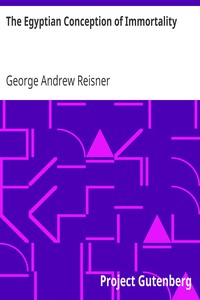The Egyptian Conception of Immortality by George Andrew Reisner
"The Egyptian Conception of Immortality" by George Andrew Reisner is a scholarly publication written during the early 20th century. This book analyzes the ancient Egyptian beliefs surrounding immortality, examining how these ideas evolved from primitive burial customs to more complex theories involving deities like Osiris. Through the use of archaeological findings and funerary texts, Reisner explores the deep-rooted cultural practices and religious beliefs that shaped the Egyptian understanding of life after death.
In this comprehensive study, Reisner presents a detailed account of the various stages of Egyptian beliefs regarding immortality throughout history, from the simple customs of pre-dynastic societies to the elaborate burial practices of the Middle and New Empires. He explains that the Egyptians believed the spirit possessed a distinct identity that persevered beyond death, continuing to have desires and needs akin to earthly existence. The author highlights how the Osiris myth served as a transformative narrative that elevated the tomb practices associated with royalty to include more common people over time, thus illustrating a gradual democratization of beliefs in the afterlife. Ultimately, the book offers insights into how these religious beliefs were intertwined with social hierarchies and the evolving dynamics of power in ancient Egypt. (This is an automatically generated summary.)
Read or download for free
| How to read | Url | Size | |||
|---|---|---|---|---|---|
| Read now! | https://www.gutenberg.org/ebooks/12255.html.images | 93 kB | |||
| EPUB3 (E-readers incl. Send-to-Kindle) | https://www.gutenberg.org/ebooks/12255.epub3.images | 111 kB | |||
| EPUB (older E-readers) | https://www.gutenberg.org/ebooks/12255.epub.images | 109 kB | |||
| EPUB (no images, older E-readers) | https://www.gutenberg.org/ebooks/12255.epub.noimages | 99 kB | |||
| Kindle | https://www.gutenberg.org/ebooks/12255.kf8.images | 236 kB | |||
| older Kindles | https://www.gutenberg.org/ebooks/12255.kindle.images | 224 kB | |||
| Plain Text UTF-8 | https://www.gutenberg.org/ebooks/12255.txt.utf-8 | 83 kB | |||
| Download HTML (zip) | https://www.gutenberg.org/cache/epub/12255/pg12255-h.zip | 109 kB | |||
| There may be more files related to this item. | |||||
Similar Books
About this eBook
| Author | Reisner, George Andrew, 1867-1942 |
|---|---|
| Title |
The Egyptian Conception of Immortality The Ingersoll Lecture, 1911 |
| Credits | E-text prepared by Aaron G. Wells |
| Reading Level | Reading ease score: 66.3 (8th & 9th grade). Neither easy nor difficult to read. |
| Language | English |
| LoC Class | BL: Philosophy, Psychology, Religion: Religion: General, Miscellaneous and Atheism |
| Subject | Immortality |
| Subject | Eschatology, Egyptian |
| Category | Text |
| EBook-No. | 12255 |
| Release Date | May 1, 2004 |
| Most Recently Updated | Oct 28, 2024 |
| Copyright Status | Public domain in the USA. |
| Downloads | 272 downloads in the last 30 days. |
| Project Gutenberg eBooks are always free! | |

